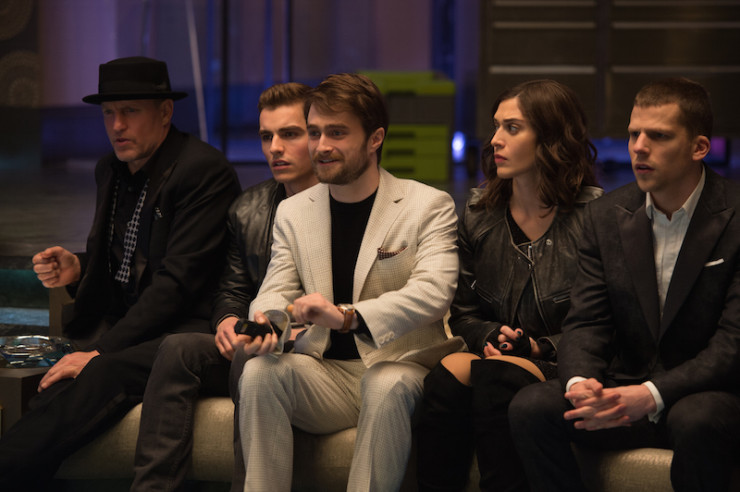Every great magic trick consists of three parts or acts. The first part is called The Pledge. The magician shows you something ordinary: a deck of cards, a bird or a man. He shows you this object. Perhaps he asks you to inspect it to see if it is indeed real, unaltered, normal. But of course… it probably isn’t. The second act is called The Turn. The magician takes the ordinary something and makes it do something extraordinary. Now you’re looking for the secret… but you won’t find it, because of course you’re not really looking. You don’t really want to know. You want to be fooled. But you wouldn’t clap yet. Because making something disappear isn’t enough; you have to bring it back. That’s why every magic trick has a third act, the hardest part, the part we call The Prestige.
Yep, I’m quoting Christopher Nolan’s The Prestige for this movie review because it is the pinnacle of magic movies for me, and because I seem to be the rare person who loved 2013’s Now You See Me enough to even consider it in the same pantheon. As his Pledge, director Louis Leterrier brought together four moderately impressive amateur magicians, imbued them with the resources and training of a secret magic society, and threw in some social commentary on robbing the rich and giving to the poor. The result was an engaging thriller built on a series of smart tricks that I was happy to not know the secrets behind.
With Now You See Me 2, a.k.a. Now You See Me: The Second Act, Jon M. Chu (G.I. Joe: Retaliation, Jem and the Holograms) has taken over the reins for a Turn that seeks to elevate the Four Horsemen of Leterrier’s vision from rock stars to legends. But while the sequel expands its physical and narrative scope and interrogates the line between magic and science, it still lacks the dazzle of the original Pledge.
Spoilers for Now You See Me, and light spoilers for Now You See Me 2.
There are few non-romantic-comedy movies that I’ll rewatch whenever they’re on television, but Now You See Me is one of them. It’s like eating candy without looking at the calorie count, like browsing a novelty store with no intention of buying anything; I’m just there for the ride. One of the biggest sticking points between my partner (who was not wowed by the first movie) and me regards the final reveal that FBI agent Dylan Rhodes (Mark Ruffalo), the man chasing the Four Horsemen, is actually their mysterious benefactor. My partner claims that the twist wasn’t earned, because in more than one scene we see Dylan still playing his alter ego even when there’s no one around to catch him. My first rejoinder would be another truism from The Prestige, that you must fully live the trick if you want to fool everyone. Second, part of the fun of Now You See Me 2 is in getting to see the Horsemen, Dylan included, finally play their true selves.
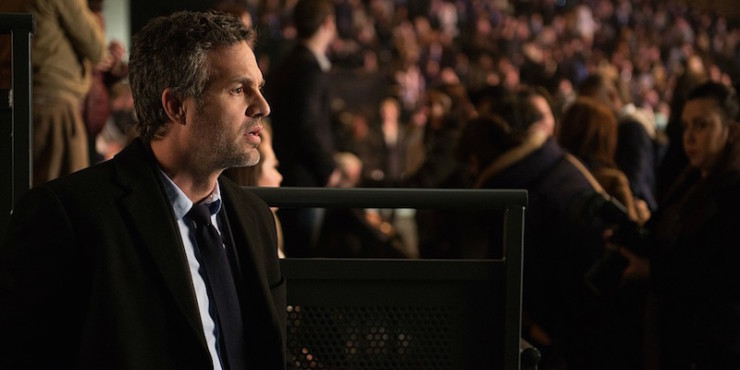
For most of the first movie, we watched the Horsemen from the perspectives of the FBI trailing them; Arthur Tressler (Michael Caine), the billionaire they drained of both his fortune and his pride; and Thaddeus Bradley (Morgan Freeman), the magic debunker one step behind figuring out the keys to their audacious (and very magical) stunts. In the sequel, we’re with the Horsemen almost the entire time, as they come out of a year of hiding, only to be spectacularly tricked and transported to Macau, “the Las Vegas of China” and (coincidentally) the heart of the Eye, the secretive organization that recruited them in the first place. Completely out of their element, they wind up in an Ocean’s Eleven-esque plot in which they must steal a MacGuffin of a computer chip for technology prodigy and amateur magician himself Walter Mabry (Daniel Radcliffe).
And compared to their seemingly polished act in the first movie, the Horsemen are going through a bit of a sophomore slump. J. Daniel Atlas (Jesse Eisenberg) chafes at waiting for instruction from Dylan and wants to be the Horsemen’s new leader; Merritt McKinney (Woody Harrelson) and Jack Wilder (Dave Franco) are so bored they’re trying to learn each other’s moves (and not very well); and new member Lula (Lizzy Caplan) is super excited to be here but has the most to learn—especially when their repertoire changes from flashy magic to steal-this-chip-or-get-murdered.
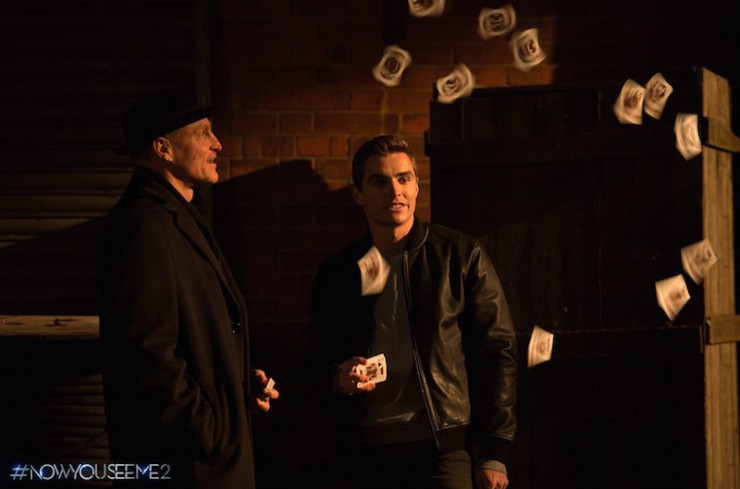
The best part about spending this movie “on the inside,” so to speak, is in how much fun Now You See Me 2 has in delving to its own internal mythology. Dylan’s reveal that he masterminded the various tricks in order to humiliate Tressler and imprison Bradley, as revenge for his father Lionel Shrike’s tragic death from a botched trick, comes in the final minutes of the first movie. Now, we get to see Dylan on the other side of his thirty-year vendetta: realizing that his grand fuck-you to Thaddeus didn’t automatically erase his struggle with his father’s legacy. When Dylan is presented with Lionel’s safe, you understand the significance and share in his simultaneous fascination and horror.
Watching the Horsemen struggle to perfect each other’s tricks is equally fascinating. In the first film, each adheres to the tarot card with which they’re identified—Atlas is The Lover, Merritt is The Hermit, Wilder is Death, and Henley (Isla Fisher) was The High Priestess—but now that the figurative deck has been shuffled, each must redefine his or her identity, which includes the realization that their skillsets can overlap. We see this best in the movie’s key set piece, a meticulously calibrated heist in a hermetically sealed room, with the prize being the aforementioned computer chip that is conveniently the size and width of a playing card. Can Merritt throw cards as well as Jack? Are Jack’s hypnosis skills up to snuff? Can Lula and Atlas work as a team? I won’t spoil the entire choreography of the scene, but it’s on par with Danny Ocean’s hijinks, if a tad long.
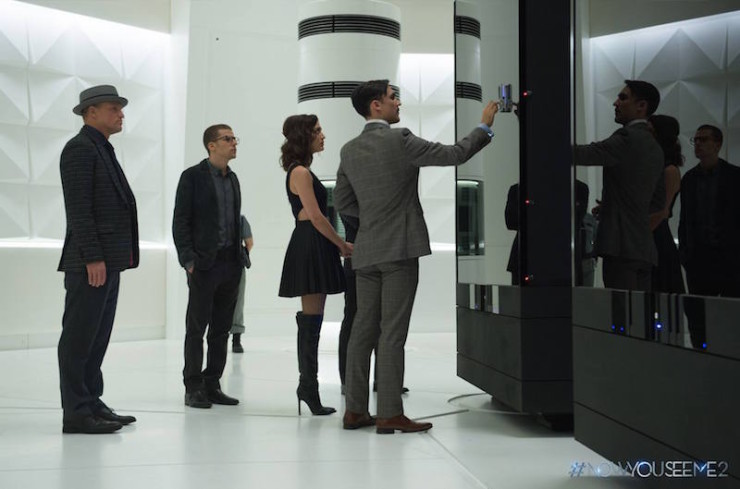
Unfortunately, the rest of the magic felt less dynamic. While Now You See Me had a veritable bag of tricks, all very different but equally enthralling, Now You See Me 2‘s sleights of hand all follow the same themes: seeing is believing and it’s all about perception. Not unlike the horror movie Fear, Inc. (which I also loved), you’re constantly flip-flopping between fully believing in a moment and then questioning every detail. Such intense interrogation would make anything fall apart, even one with David Copperfield as an adviser. It doesn’t help that the addition of Lula makes everything bigger—she has a penchant for chopping off fake limbs—and moves further away from the subtlety of the original’s tricks.
The social commentary doesn’t stick the landing, either; the Horsemen are still Robin Hoods of a sort, except instead of calling out the rich for screwing over the poor, they’re championing all of the little people “inside the grid” subject to invasive surveillance from anyone—their peers, the NSA, you name it, it’s not important who, just that it happens. Which, when you think about the fact that the Eye is watching their every move, is incredibly ironic. It’s very on-trend and already makes me wonder what a third movie could tackle.
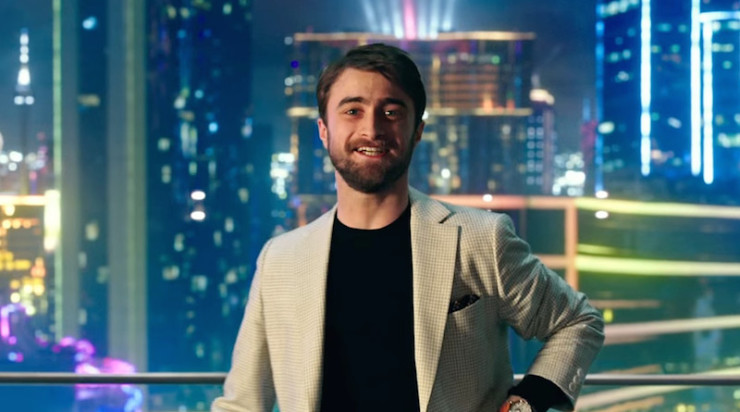
However, the best part of this movie is Walter Mabry, Radcliffe’s socially awkward, pint-sized Bond villain. It’s already a hoot to watch Harry Potter explain how science trumps magic, but it’s the faux-hospitality and impeccable use of PowerPoint (and Comic Sans) that makes him such a delightfully bizarre villain. Like Dylan, he’s struggling to step out of his father’s shadow, which is especially difficult when that man is Michael Caine. (The movie treats this as a big reveal, but it was in all of the casting news.) He’s also just batty, obsessed with maintaining his fake death “off the grid” yet scavenging everyone else’s most private information. He drinks tea while watching a foe drown, for crissakes—it is complete camp, and I hope that Daniel Radcliffe just keeps taking on these roles, because he is stellar at them.
In fact, some of the best players in this caper are the ones who have a healthy sense of self-awareness. Dylan’s insistence on “I’m the same person” even as he lives a double life gives me flashes of Bruce Banner and the Hulk, minus the ridiculous sneering his way through every magic trick (hey, he looks like he’s having fun). Caplan especially hits the nail on the head, as the movie’s sole female lead: More than once she points to the fact that she replaced Henley (and, by extension, Fisher) as well as how the women in these kinds of movies (the Ocean’s trilogy included) are better used for their assets than for any actual skills. Despite the sequel having a much more international flavor, we also miss out on Interpol agent Alma Dray (Mélanie Laurent). Sanaa Lathan pops in for a bafflingly small role as Dylan’s boss at the FBI—I guess Common was busy—that she must expect to expand in future installments.
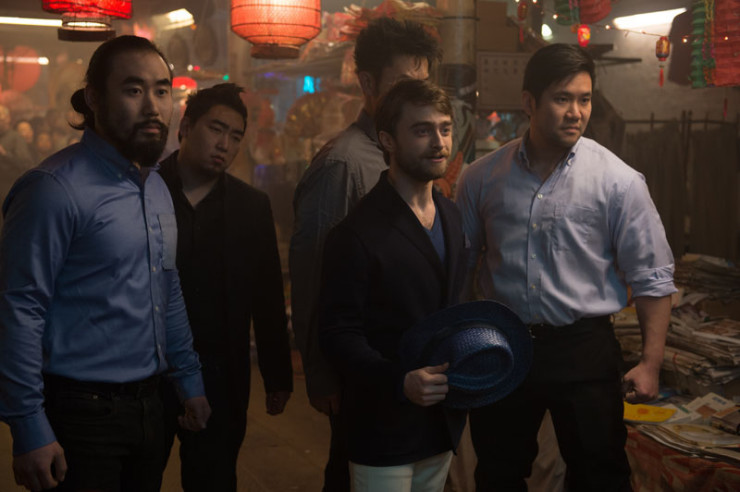
Now You See Me 2 walks a thin tightrope with Macau as its setting. There’s a lot of temptation to revert to the stereotypes of Asian mysticism, which the film thankfully avoids for the most part. There is your requisite badass Chinese grandmother and her with-the-times grandson (international pop sensation Jay Chou! tragically underused), who I would have liked to see have more agency than simply handing over the ancient tricks at their magic shop. Though that rain trick was tight. Still, expanding the mythology of these movies beyond just New York City was a smart move.
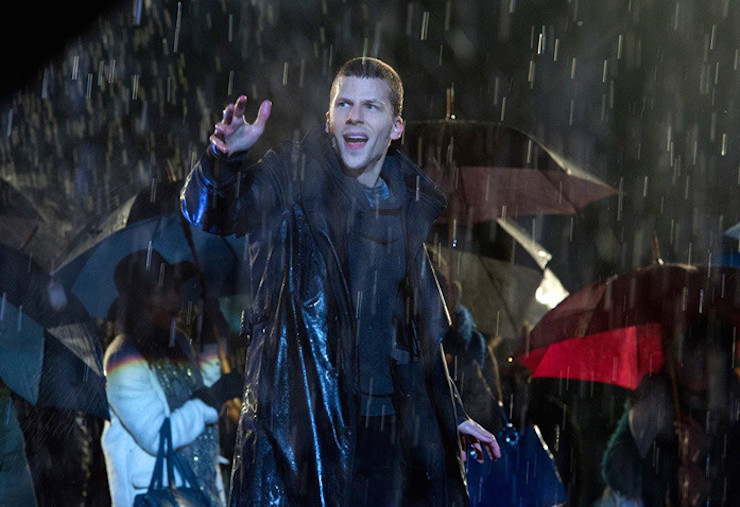
I guess this movie answers why they didn’t decide to title it (the much more clever) Now You Don’t; they’re building a franchise. And with comic book superhero movie fatigue settling in, I welcome a new series that is interested in turning over every stone and peeking behind every curtain. But how will Chu—who has already signed on for Now You See Me 3—perform a Prestige of his own?
Natalie Zutter wonders if Rudy Coby, her dad’s favorite magician, will be the adviser on Now You See Me 3. Tweet at her about magic and science!










